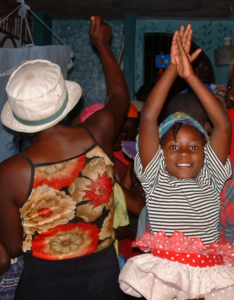 In a Friday market at the crossroads called Chada on the island of LaGonave in Haiti, I stopped at the rum seller’s table. I wanted to buy some kleren, local rum, distilled sugar cane spirits.
In a Friday market at the crossroads called Chada on the island of LaGonave in Haiti, I stopped at the rum seller’s table. I wanted to buy some kleren, local rum, distilled sugar cane spirits.
“If you want some rum, you have to buy this,” the man said, and indicated a bottle of Babincourt, the Haitian national rum, bearing an undisturbed seal on its cap.
I wanted kleren, the rum the locals drank. It’s pink and so sugary it’s practically nutritious.
In addition to kleren, they make another spirit drink locally—tafya. The maker goes out and gathers a secret combination of leaves and bark, stuffs them into a bottle and tops it off with kleren. The mixture is steeped in a dark place for weeks or months, until the mixture turns to tafya.
I definitely wasn’t after tafya. I just wanted a little bottle of kleren, but the vendor shook his head. “You don’t understand,” he said. “This…” and he waved at the bottles of kleren, “is for people with no self-respect. You want a little drink now and again, you take this.” He thrust the bottle of commercial rum at me.
I still wanted the kleren. He said no. I moved on. I thought he would chase me down and reconsider like vendors often do when you don’t like their terms and walk away. But he didn’t.
I don’t know the whole sociology of alcohol in Haiti. In the countryside, I’ve heard enough tales of known drunkards that reliably squander family resources on drink. There’s definitely a connection between domestic violence and alcohol consumption. What you don’t see much of though, is casual social drinking. Most people won’t squander their limited financial resources on alcohol. So I’ve ended up knowing a lot of Haitians who are happy to take a drink now and again, but rarely do.
Once, I attended a going-away party for a visitor who had spent several months in the community and became very popular with a lot of folks. The room was already elbow-to-elbow with people when the guest of honor showed up, bearing an unopened bottle of Babincourt rum. She unscrewed the cap, took a pull, and handed it off. The bottle quickly made its way around the room. And the party erupted.
A guitar was passed from hand to hand. People whooped, sang, and told riddles. They made up jokes and acted out stories about each other. Inspired by the adults, children shrieked, played chase and did acrobatics. Everyone danced.
Two hours later, everybody had gone home.
The party lived on the whole next day in the collective imagination. People re-performed the jokes and repeated the best lyrics to the improvised songs. Folks who weren’t there told you enhanced versions of the stories they’d heard about you. They told you why the party would have been even better if they had come.
I suppose that’s how you get self-respect out of a bottle of rum: spill it into the community with a homeopathic dose for everyone, letting all the good spirits loose.